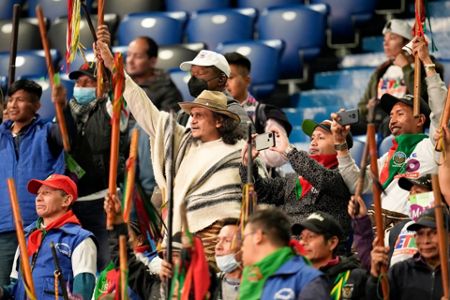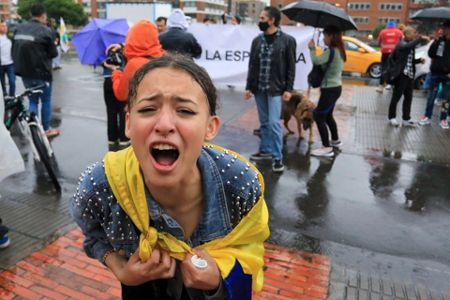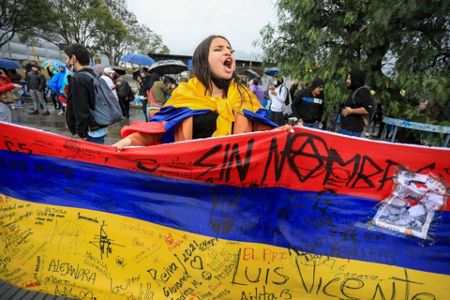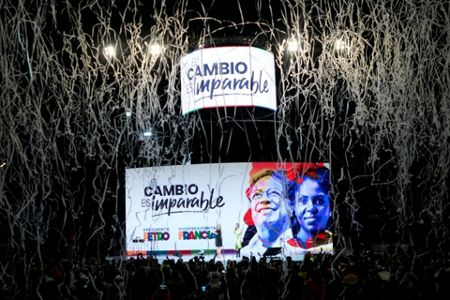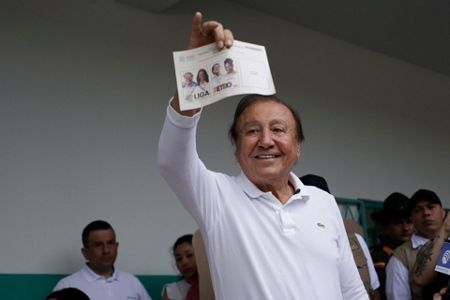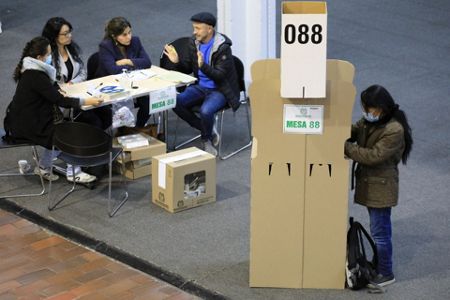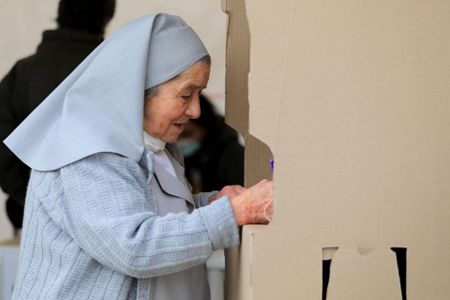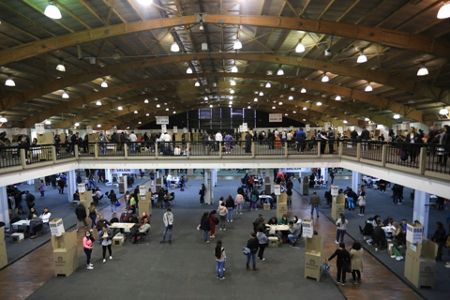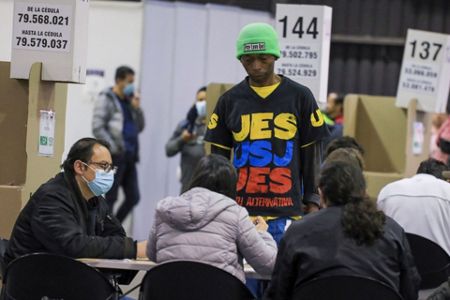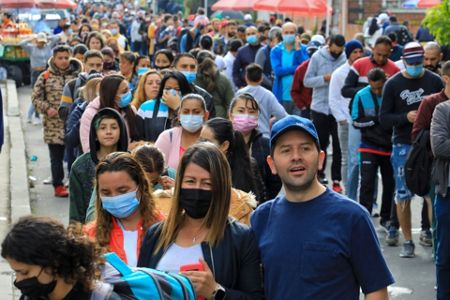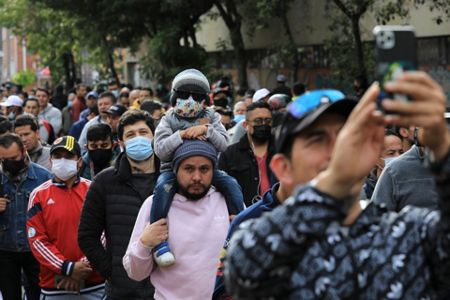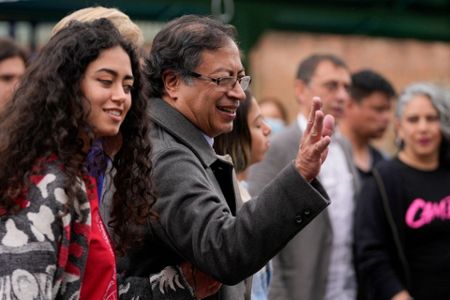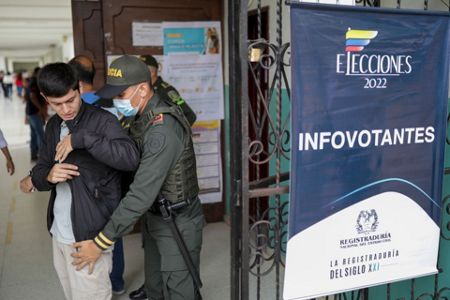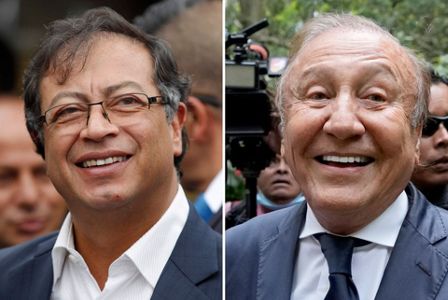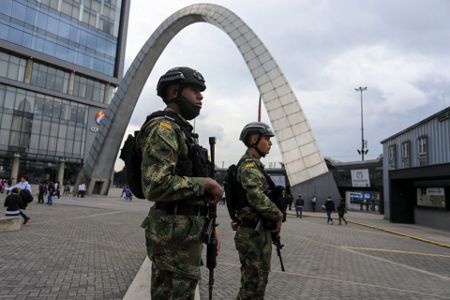BOGOTA, Colombia (AP) — Former rebel Gustavo Petro narrowly won a runoff election over a political outsider millionaire Sunday, ushering in a new era of politics for Colombia by becoming the country's first leftist president.
Petro, a senator in his third attempt to win the presidency, had 50.47% of the votes, while real estate magnate Rodolfo Hernández had 47.27%, with almost all ballots counted, according to results released by election authorities.
Petro will be officially declared winner after a formal count that will take a few days. Historically, the preliminary results have coincided with the final ones.
Petro’s victory underlined a drastic change in presidential politics for a country that has long marginalized the left for its perceived association with the armed conflict.
“Today is a day of celebration for the people. Let them celebrate the first popular victory,” Petro tweeted. “May so many sufferings be cushioned in the joy that today floods the heart of the Homeland.”
At his headquarters in the capital city of Bogota, a message on a screen read, “Gracias Colombia,” or “Thank you Colombia.”
Outgoing conservative President Iván Duque congratulated Petro shortly after results were announced, and Hernández quickly conceded his defeat.
“I accept the result, as it should be, if we want our institutions to be firm,” Hernández said in a video on social media. “I sincerely hope that this decision is beneficial for everyone.”
Polls ahead of the runoff had indicated Petro and Hernández — both former mayors — were in a tight race since they topped four other candidates in the initial May 29 election, though neither got enough votes to win outright and headed into the runoff.
About 39 million people were eligible to vote Sunday, but abstentionism has been above 40% in every presidential election since 1990.
The vote came amid widespread discontent over rising inequality, inflation and violence — factors that led voters in the first round to turn their backs on the long-governing centrist and right-leaning politicians and chose two outsiders in Latin America's third-most populated nation.
Petro, 62, was once a rebel with the now-defunct M-19 movement and was granted amnesty after being jailed for his involvement with the group.
He has proposed ambitious pension, tax, health and agricultural reforms and changes to how Colombia fights drug cartels and other armed groups. He obtained 40% of the votes during last month’s election and Hernández 28%, but the difference quickly narrowed as Hernández began to attract so-called anti-Petrista voters.
Petro's showing was the latest leftist political victory in Latin America fueled by voters’ desire for change. Chile, Peru and Honduras elected leftist presidents in 2021, and in Brazil, former President Luiz Inácio Lula da Silva is leading the polls for this year’s presidential election.
The 77-year-old Hernández, who made his money in real estate, is not affiliated with any major political party and rejected alliances. His austere campaign, waged mostly on TikTok and other social media platforms, was self-financed.
His proposals were based on a fight against corruption, which he blames for poverty and the loss of state resources that could be used on social programs. He wants to reduce the size of government by eliminating various embassies and presidential offices, turning the presidential palace into a museum and reducing the use of the president's aircraft fleet.
Hernández surged late in the first-round campaign past more conventional candidates and shocked many when he finished second. He has faced controversies including saying he admired Adolf Hitler before apologizing and saying that he meant to refer to Albert Einstein.
Duque earlier Sunday urged Colombians to vote and trust the institutions “with full confidence in the verdict of the people.”
Petro had questioned election authorities during the campaign and said he would analyze after polls closed whether he accepts the results.
After casting his ballot, he called on supporters to vote in large numbers to “defeat any attempt at fraud” and claimed, without showing evidence, that voters in some polling stations were being given ballots previously marked as blank votes in an attempt to “cancel votes that would go for the change.”
Silvia Otero Bahamón, a political science professor at the University of Rosario, said that although both candidates are populists who “have an ideology based on the division between the corrupt elite and the people,” each sees their fight against the establishment differently.
“Petro relates to the poor, the ethnic and cultural minorities of the most peripheral regions of the nation," Otero said, while Hernández’s supporters "are the people who have been let down by politicking and corruption. It is a looser community, which the candidate reaches directly via social networks.”
Polls say most Colombians believe the country is heading in the wrong direction and disapprove of Duque, who was not eligible to seek reelection. The pandemic set back the country’s anti-poverty efforts by at least a decade. Official figures show that 39% of Colombia’s lived on less than $89 a month last year.
The rejection of politics as usual “is a reflection of the fact that the people are fed up with the same people as always,” said Nataly Amezquita, a 26-year-old civil engineer waiting to vote. “We have to create greater social change. Many people in the country aren’t in the best condition.”
But even the two outsider candidates left her cold. She said she would cast a blank ballot: “I don’t like either of the two candidates.... Neither of them seems like a good person to me.”
Many voters were basing their decision on what they do not want, instead of what they do want.
“Many people said, ‘I don’t care who is standing against Petro, I’m going to vote for whomever represents the other candidate, regardless of who that person is,’” said Silvana Amaya, a senior analyst with the firm Control Risks. “That also works the other way around. Rodolfo has been portrayed as this crazy old man, communication genius and extravagant character (so) that some people say: ‘I don’t care who I have to vote for, but I don’t want him to be my president.’”
Either will have a tough time delivering on promises as neither has a majority in Congress, which is key to carrying out reforms.
In recent legislative elections, Petro’s political movement obtained 20 seats in the Senate, a plurality, but he would still have to make concessions in negotiations with other parties. Hernández’s political movement only has two representatives in the lower house, so he would also have to seek agreements with lawmakers, whom he has alienated by repeatedly calling “thieves."
___
Garcia Cano reported from Caracas, Venezuela.
Copyright 2022 The Associated Press. All rights reserved. This material may not be published, broadcast, rewritten or redistributed without permission.


